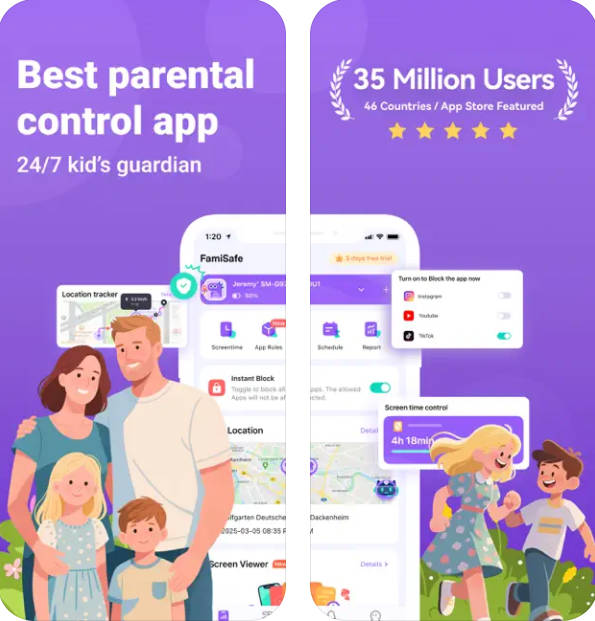Parenting a teenager in the digital age often feels like trying to read a dictionary that rewrites itself every single day. Just when you’ve figured out what "rizz" means, a new wave of words, memes, and inside jokes crashes onto the shore of your understanding. One term that has surfaced with increasing frequency is "menty b." It’s short, it sounds playful, but it points to something far more significant: how Gen Z is talking about mental health. This guide is here to decode the menty b meaning, explore its complex role in your teen's world, and offer real, actionable advice on how to respond with empathy and support.

In This Article
Part 1. What Exactly is a 'Menty B'?
At its core, "menty b" is internet slang for a "mental breakdown." It’s a clipped, almost casual-sounding abbreviation that has exploded in popularity on platforms like TikTok, X (formerly Twitter), and in private group chats. You might see it used in posts or hear it in conversations in a variety of contexts.
For instance, a teen might text their friend:
"I'm having a total menty b over this history exam. I can't remember any of the dates."
Or post a video with a caption like:
"The Wi-Fi going out during my final presentation almost caused a menty b. 😭"
The key thing for parents to understand is the nuance. While the term "mental breakdown" sounds incredibly alarming, what does menty b mean in typical teen usage? It's generally used to describe a moment of intense stress, frustration, or feeling completely overwhelmed. It often captures a feeling of being at a breaking point over academic pressure, social drama, or even minor daily inconveniences. It’s less about describing a diagnosed clinical condition and more about expressing a temporary state of emotional overload.
Part 2. The Two Sides of 'Menty B': Destigmatizing or Trivializing?
The rise of mental health slang like "menty b" has sparked a crucial debate among parents, teens, and mental health professionals. Is this new vocabulary a positive step toward open conversation, or does it dangerously downplay serious issues? The truth is, it’s a bit of both. Understanding these two sides is essential for grasping the full context of menty b slang.
The Positive View: Opening Up the Conversation
For many teens, using lighthearted language is a way to broach a heavy topic. It can feel less intimidating to say "I'm having a little menty b" than "I am experiencing overwhelming anxiety that is making it difficult for me to function." This slang normalizes discussions about mental struggles, creating a sense of community and shared experience. When teens see their peers using the same language, it helps them feel less isolated in their feelings. Humor can be a powerful coping mechanism, and for some, it’s the first step toward acknowledging that they need help.
The Negative View: Minimizing a Serious Issue
On the other hand, many experts express valid concerns. As clinical psychologist Dr. Nicholas Westers notes, using "cutesy language" can sometimes minimize the severity of actual mental health disorders. There's a real danger that this kind of slang can trivialize conditions like major depressive disorder or generalized anxiety disorder.
"There's a concern that this informal language might minimize the gravity of actual mental health conditions, making it harder to distinguish between everyday stress and clinically significant struggles."
This trivialization can lead to desensitization, where the weight of terms like "mental breakdown" is lost. It can also become an "avoidant coping strategy," allowing a teen to use humor to distance themselves from their genuine pain rather than confronting and processing it.
Part 2. Your Teen Said They're Having a 'Menty B.' Now What?
So, you've overheard your teen say they're "having a menty b." Your first instinct might be to panic. The most important thing to remember is that your response is critical—it can either open the door to conversation or slam it shut. The goal is always connection, not correction.
Here is some actionable advice for how to proceed:
- Don't Panic or Overreact. A teen using slang doesn't automatically signal a five-alarm crisis. Reacting with immediate alarm can make them regret opening up at all. Take a deep breath and approach the situation with calm curiosity.
- Listen and Validate. Before you offer solutions, simply validate their feelings. Empathetic phrases can make a world of difference. Try saying, "That sounds really tough," or "I'm sorry you're feeling so overwhelmed right now." This shows you're on their side.
- Ask Open-Ended Questions. Gently probe for more context to understand the scale of the problem. Instead of a yes/no question like "Are you okay?", try something more open: "What's making you feel that way?" or "That sounds like a lot to handle. What's on your mind?"
- Look for Deeper Signs. The slang itself is just one piece of the puzzle. Pay attention to their behavior beyond the words. Have you noticed changes in their sleep patterns or eating habits? Are they withdrawing from friends or losing interest in their favorite hobbies? A drop in grades? These behavioral shifts, combined with the slang, paint a fuller picture and may indicate a more persistent problem that requires attention, including setting healthy digital boundaries.
Part 3. How to Decode Risky Slang and Stay Aware
Let's be realistic: no parent can keep up with every new slang term. Trying to do so is an exhausting and ultimately futile game of catch-up. The real goal isn't to become a slang expert, but to stay aware of patterns that might signal risk and to keep the lines of communication open.
While open conversation is always the best approach, sometimes teens are unable or unwilling to share the full extent of their struggles. In these situations, parents need a way to stay informed about potential dangers without resorting to invasive snooping. This is where parental control tools like FamiSafe can serve as a critical safety net. It’s designed to help you protect your child by making you aware of potential dangers and fostering opportunities for conversation.
FamiSafe's Alert Words feature is particularly useful for this. You can create a custom list of concerning slang terms (like menty b meaning, 'stressy,' 'depressy,' or other words you learn about related to anxiety, self-harm, or bullying). The app will then send you an instant alert if these words are detected in your child's texts, searches, or on supported social media platforms. This isn't about spying; it's about creating a notification system for red flags, allowing you to initiate a conversation when it's needed most.

Furthermore, features like the Activity Report give you a clear overview of your child's device usage, helping you spot unusual patterns—such as excessive late-night screen time—that might correlate with feelings of anxiety or depression. By detecting potentially risky slang, FamiSafe acts as a tool for awareness and prevention, enabling you to step in with support before a small problem becomes a large one.
Conclusion
Understanding what does menty b mean is a great first step, but it's only the beginning. This simple slang term reveals a complex truth: our teens are navigating immense pressures, and they've created a new language to talk about it. We've seen its power to both destigmatize and trivialize mental health struggles.
Ultimately, knowing the latest slang is far less important than creating an environment of trust, empathy, and open communication in your home. Use this knowledge not as a "gotcha" moment, but as a bridge to connect with your teen. Ask questions, listen without judgment, and remind them they are not alone. By doing so, you can help them navigate the challenges they face and ensure their overall online safety, building a foundation of support that will last long after the slang terms have changed.


